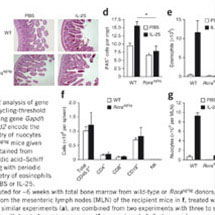 A group of collaborative researchers, led by Andrew McKenzie’s group in the LMB’s PNAC Division, have identified new processes that lead to the development of a novel cell (the nuocyte) implicated in allergies.
A group of collaborative researchers, led by Andrew McKenzie’s group in the LMB’s PNAC Division, have identified new processes that lead to the development of a novel cell (the nuocyte) implicated in allergies.
Nuocytes play a critical role in immune responses to parasitic worm infection. However, they also initiate the early generation of immune responses that can lead to asthma or other allergic conditions.
The team used multicolour flow cytometry, in vitro cell culture and in vivo models to find out more about the lineage of nuocytes and the signals that induce their development.
They found that nuocytes arise in the bone marrow and differentiate from common lymphoid progenitors – meaning that they are distinct, previously unknown members of the lymphoid lineage. Nuocytes also require the interleukin 7, interleukin 33, Notch and RAR-related orphan receptor αlpha (RORα) signalling pathways for their development. The transcription factor RORα was also identified as being critical for both the generation of nuocytes and allergic-like inflammation.
Asthma alone affects 5.4 million people in the UK and costs the NHS £1 billion a year. The team’s work in increasing understanding of the processes and cells involved in causing allergic inflammation provides a critical first step in developing new strategies to treat allergic diseases.
The research team included collaborators from the Institute of Molecular Medicine, School of Medicine at Trinity College Dublin, and the École Polytechnique Fédérale de Lausanne, Institut Suisse de Recherche Expérimentale sur le Cancer.
The research was supported by the Medical Research Council, Centocor (Johnson & Johnson), the American Asthma Foundation, Science Foundation Ireland, the National Children’s Research Centre and the American Asthma Foundation.